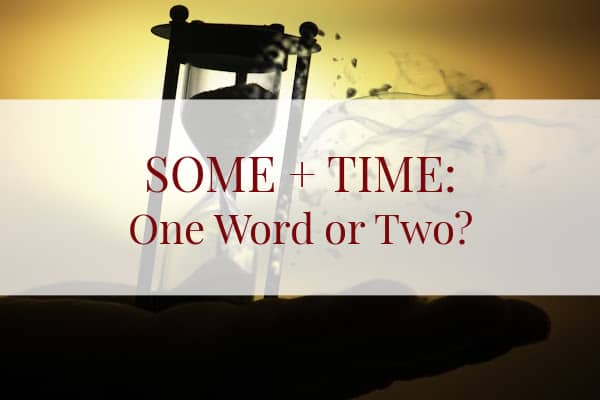Some Time vs. Sometime: How to Get It Right
While “sometime” and “some time” are two separate terms with their own distinct meanings, it’s common to get tripped up and use the wrong one.
But once you understand the distinctions between them, it become much easier to get it right every time.
The adverb: Sometime
“Sometime” has multiple uses, but the most common is an adverb. It’s defined by Merriam-Webster as “at some time in the future” or “at some not specified or definitely known point of time.”
To put this into a single phrase, I would define it as “at an unspecified point in time.”
If you plan on doing laundry over the weekend but don’t know exactly when it’s going to happen, you could say “I’ll do laundry sometime this weekend.” If you did it yesterday morning but don’t remember exactly when or don’t feel like specifying, you could say “I did it sometime yesterday morning.”
The noun phrase: Some Time
The two-word noun phrase “some time” is made up of the indefinite pronoun “some” followed by the noun “time.”
A noun phrase is a proper noun, a personal pronoun, an indefinite pronoun, or a common noun with or without a determiner.1 “Some time” is in the last category of noun phrases, being made up of the common noun “time” and the determiner “some”.
While the adverb “sometime” refers to an unspecified point in time, the noun phrase “some time” refers to an unspecified amount of time. You see it in sentences like “I need some time to work on this,” or “I’m busy today, but I’ll have some time tomorrow.”
When “some time” is used adverbially
Part of what makes these words hard to tell apart is because, while it may seem that the adverb and noun phrase have different grammatical roles, the noun phrase is often used adverbially.
Take a look at the following two examples:
“He responded to the email sometime after he received it.”
“He responded to the email some time after he received it.”
In these examples, “sometime” and “some time” have the same grammatical function. The best way to tell the difference is from the meaning, not the grammar. In the first example, our subject responds to the email at a certain point in time. In the second, our subject responds to the email after a certain amount of time.
And we can take the difference in meaning a step further. I talked before about “sometime” being a point in time while “some time” is an amount of time. Garner goes so far as to define “some time” as “quite a while.” His definition is Merriam-Webster’s definition with an extra dose of connotation.2
While you can think of “some time” as meaning just an unspecified amount of time, and in my understanding it can occasionally refer to a shorter time period, there is often a connotation of it taking a while.
Going back to those two examples, “He responded to the email sometime after he received it” states that he responded at an unspecified time. We don’t know when he responded, just that it was after he received the email.
Whereas “He responded to the email some time after he received it” states that it took quite a while for him to respond. It’s not specific about how long it took, but it took an unspecified amount of time with a strong connotation that it was rather lengthy or lengthier than might be expected.
Some tricks to tell them apart
Merriam-Webster’s Dictionary of English Usage recommends inserting “quite” before “some” as a way to check which form to use. The “quite” will sound correct with the two-word noun phrase but incorrect with the single-word adverb.3
The sentence “They worked on it for some time” would become “They worked on it for quite some time,” which is grammatically sound. With the sentence “I’ll do it sometime today,” this strategy gives us “I’ll do it quite sometime today,” which sounds off.
You can also try inserting a word between “some” and “time.” “I need some free time” sounds correct while “I did it some more time last week” is less intelligible.
If you can add “quite” before the word or insert an adjective in the middle, you should use the two-word form “some time.” If that makes your sentence sound wrong, you’ll need the one-word form.
The adjective: Sometime
In addition to the adverb “sometime” and the noun phrase “some time,” there is also an adjective “sometime.” You won’t see it very often, but if you ever do need it, you’ll want to know how to use it.
The adjective “sometime” is synonymous with “former” or “occasional”—at least according to Merriam-Webster. For example, “She is a sometime accountant who now writes for a living instead.” With the second meaning, “They are sometime gardeners when they can find time in their busy schedules.”
Note that the adjective is always one word and never ends in -s. They’re “sometime gardeners,” not “sometimes gardeners.”
There’s some disagreement on what the correct usage of this word is. Counter to Merriam-Webster’s definition, Garner believes that “The word does not properly signify ‘on-again-off-again’ or ‘occasional.’”4 Garner is a prescriptivist, meaning that he is on the conservative side on topics of language change.
Merriam-Webster’s Dictionary of English Usage (DEU), which takes more of a descriptivist approach, calls “occasional” a newer but nevertheless correct sense of the word, noting that it was first attested in the 1930s. This sense “has only recently begun to show up in dictionaries,” says the DEU, a book last updated in 1994. It goes on to say that there is “no question about its being standard English” but that “you still stand a small chance of being criticized if you use it.”5 By people like Garner, apparently.
It should be safe in most situations to use the adjective with either meaning, provided that you write it as one word. Formal writing is where you might want to be more careful about using newer, less established definitions. The most important thing is to make sure you write it as one word.
“Sometimes” is usually one word
The last thing I wanted to mention is how “sometimes” and “some times” fit into the conversation. The word “sometimes,” which kind of looks like a plural form of “sometime,” is a separate adverb with a similar but distinct meaning. It is roughly synonymous with “occasionally.”
You would use “sometimes” in a sentence like “I sometimes go to the store, but I usually order things online.”
“Some times” is less common and mostly exists in awkward constructions such as “Some times are better than others.” It’s essentially a plural of the noun phrase we looked at before, except this one isn’t used in an adverbial function. Fowler’s Dictionary of Modern English Usage defines it as synonymous with “certain times.”6 Instead of amounts of time, the two-word “some times” refers to distinct occasions.
- Bryan A. Garner, The Chicago Guide to Grammar, Usage, and Punctuation (Chicago: The University of Chicago Press, 2016), 197.
- Bryan A. Garner, Garner’s Modern English Usage, 4th ed. (New York: Oxford University Press, 2016), 844.
- Merriam-Webster’s Dictionary of English Usage. (Springfield, Mass.: Merriam-Webster, 1994), 861.
- Bryan A. Garner, Garner’s Modern English Usage, 4th ed. (New York: Oxford University Press, 2016), 844.
- Merriam-Webster’s Dictionary of English Usage. (Springfield, Mass.: Merriam-Webster, 1994), 861.
- Fowler’s Dictionary of Modern English Usage, 4th ed., edited by Jeremy Butterfield (New York: Oxford University Press, 2015), 762.





